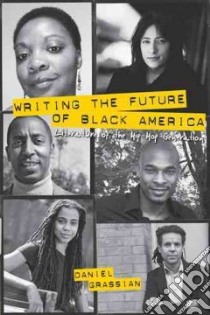Writing the Future of Black America - 9781570037818
Un libro in lingua di Daniel Grassian edito da Univ of South Carolina Pr, 2009
- € 31.90
- Il prezzo è variabile in funzione del cambio della valuta d’origine
Writing the Future of Black America explores the work of eight representative African American writers of the hip-hop generation to assess their common themes and offer insights into contemporary race relations in America as expressed and challenged in their works. In this groundbreaking study, Daniel Grassian takes as his subjects a group of impressive novelists, essayists, poets, and playwrights - Paul Beatty, Trey Ellis, Terrence Hayes, Allison Joseph, Jake Lamar, Suzan-Lori Parks, Danzy Senna, and Colson Whitehead - to chart the depths of their literary work against that of their predecessors in the civil rights generation and their predominantly white contemporaries of Generation X.
Although African American writers such as Toni Morrison, Maya Angelou, and Alice Walker have risen to mainstream prominence thanks to vehicles such as Oprah's Book Club, significantly less critical and commercial attention has been given to their proverbial literary offspring, those African American writers born in the 1960s and 1970s who are part of the hip-hop generation. Characterized by the pursuit of empowerment through hybridity, social criticism, and personal expression, hip-hop has become the music and culture of choice for a sizable portion of America, regardless of race or socioeconomic standing. Meanwhile the writers of this generation have received little serious critical attention, aside from singular book reviews and occasional essays. Grassian fills in a gap in the discourse with his thorough analysis of the works crafted by these eight distinguished hip-hop writers, and he makes a case for the validity and value of studying their sophisticated engagements with race in contemporary America. To that end he maps their writings against the larger field of African American literature and the larger-yet canon of American literature to show their distinctive contributions to each.
Selected because their work addresses a broad range of African American life, these writers fathom such topics as what it means to be African American or multiethnic in an increasingly global society, what role art and literature play in affecting their communities, and what positive and negative authority has been assigned to popular culture (and hip-hop culture specifically) in modern African American life. Their responses are provocative and emblematic of the evolving attitudes expressed by the generation they represent. In this first critical appreciation of hip-hop writers, Grassian finds myriad social challenges faced by this generation of authors and thinkers, bur also definable elements of progress that they herald and continue to shape in ongoing racial struggles.
Informazioni bibliografiche
- Titolo del Libro in lingua: Writing the Future of Black America
- Sottotitolo: Literature of the Hip-hop Generation
- Lingua: English
- Autore: Daniel Grassian
- Editore: Univ of South Carolina Pr
- Collana: (Hardcover)
- Data di Pubblicazione: 01 Gennaio '09
- Genere: LITERARY CRITICISM
- Argomenti : American literature African American authors History and criticism American prose literature African American authors- History and criticism Hip-hop Influence
- Dimensioni mm: 228 x 158 x 25
- ISBN-10: 1570037817
- EAN-13: 9781570037818


